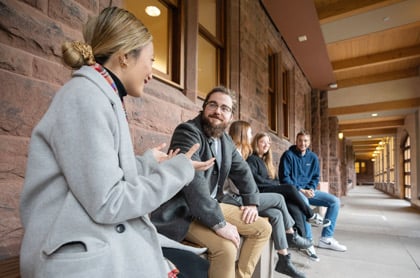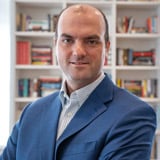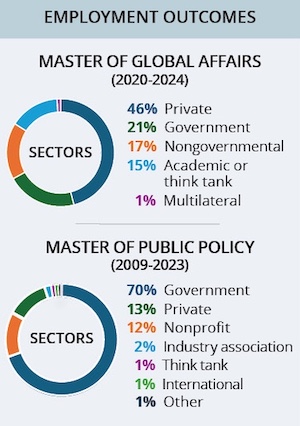Gain the Edge: Graduate Programs for Careers Tackling Global Challenges
University of Toronto, Munk School of Global Affairs and Public Policy
Experiential Approach Guides Students Toward Rewarding Careers

In mid-February, as global conflicts were dominating the headlines, 30 Munk School students were learning in real time. A cohort from the Master of Global Affairs program traveled to the North Atlantic Treaty Organization (NATO) in Brussels, where they talked to European Union (EU) policymakers about the war in Ukraine and the US threat to withdraw from NATO. Meanwhile, a group of Master of Public Policy students was in London with the Munk School Urban Policy Lab to see how that city’s government operates.
Combining academic and practical training is part of the Munk School’s modus operandi. “Students tackle important issues in international relations alongside others examining strategies that a government-relations official in the private sector might use,” says Michael Donnelly, director of professional master’s programs. “The big picture drives our approach.”
With a reputation for scholarly excellence, the Munk School provides customized access within a huge network. The highly regarded, 100,000-student University of Toronto offers a plethora of graduate programs, including those for engineering, computer science, and public health. “For our students, there’s somebody who’s a specialist in exactly what they care about within walking distance,” Donnelly says.

“Our internships, between the first and second years, involve working full-time, integrating academic ideas into the professional world, then bringing that experience back to the classroom.” –Michael Donnelly, Director of Professional Master’s Programs, Munk School of Global Affairs and Public Policy, University of Toronto
The Munk School is in the heart of downtown Toronto — a center for business, culture, and education, and an international hub. “There are always major Canadian figures coming through campus who want our advice,” Donnelly says. “We recently ran a two-day AI Accelerator Program for senior government decision-makers and put our students in the room with industry leaders, policymakers, and academics. They benefit from those kinds of connections.”
In June 2022, four months after the Russia-Ukraine war began, Munk School students took part in a live video Q&A with Ukraine’s president, Volodymyr Zelenskyy. “It was fantastic,” Donnelly recalls. “We were so fortunate to put students at the heart of this conversation.

Among the Munk School’s many other offerings are dual-degree programs enabling students to earn complementary degrees at the Munk School and schools in London, Paris, Berlin, and Madrid; career-focused internships in Canada and abroad; and research centers and labs focused on economics, justice, immigration, technology, and other topics.
About 90 percent of Munk School graduates are employed three months after graduation in hugely diverse roles across the private sector, government, and nongovernmental organizations. Serving as examples of what graduates can achieve are four notable alumni: Celine Caira, economist and policy analyst (artificial intelligence), OECD; Ryan MacDonald, senior manager, management consulting for KPMG Canada and director, health AI implementation at Vector Institute; Jeremy Bruce, director of Canada-US relations for Canada’s Office of the Minister of Foreign Affairs; and Aline Nizigama, national CEO, YWCA Canada.
University of Toronto, Munk School of Global Affairs and Public Policy
https://munkschool.utoronto.ca
[email protected]
416-946-8900![]()
Contents
- Gain the Edge: Graduate Programs for Careers Tackling Global Challenges
- Thunderbird School of Global Management at Arizona State University
- University of Pittsburgh, School of Public and International Affairs
- Johns Hopkins University School of Advanced International Studies
- The Fletcher School at Tufts University
- Georgetown University, School of Foreign Service
- George Mason University, Schar School of Policy and Government
- University of Denver, Josef Korbel School of International Studies
- Indiana University, Hamilton Lugar School of Global and International Studies
- University of Toronto, Munk School of Global Affairs and Public Policy
- Yale University, Jackson School of Global Affairs
- Seton Hall University, School of Diplomacy and International Relations

